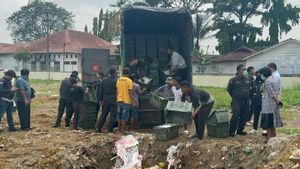JAKARTA - Cancer is still one of the biggest health challenges in Indonesia. Based on data from the Indonesian Ministry of Health, BPJS's expenditure for cancer treatment increased significantly from IDR 3.1 trillion in 2020 to IDR 5.9 trillion in 2023, with an increase of almost 50 percent.
One of the main challenges in cancer control is the delay in diagnosis, which has an impact on the low level of successful treatment.
Nuclear medicine is now one of the approaches that can help overcome this problem. This technology allows for more accurate diagnosis and more effective treatment, particularly through radiotherapy or radioactive isotopic-based therapy.
As a medical branch that utilizes radioactive material, nuclear medicine is able to provide innovative solutions in early detection and treatment of cancer.
According to Lupi Trilaksono, SF, MM, Apt, Director of Quality Improvement of Indonesian Health Workers, cancer is the third highest cause of death in Indonesia after stroke and heart disease.
Therefore, the Ministry of Health has launched the 2024-2034 National Cancer Plan, which involves a comprehensive approach from prevention to treatment. In this effort, health workers need to be equipped with appropriate competencies to utilize modern technology, including nuclear medicine.
In this case, the development of medical personnel capacity is one of the main steps in encouraging the optimization of nuclear medical-based services. Intensive training programs continue to be carried out to improve the expertise of health workers, including specialist doctors, radiographers, medical physicists, and biomedical technicians.
The multidisciplinary approach is also considered important so that nuclear medical technology can be utilized effectively and have a significant impact on health services in Indonesia.
On the same occasion, Dr. Ayu Rosemeilia Dewi, SpKN-TM(K), FANMB, a nuclear medicine specialist, explained the importance of a collaborative approach in the development of nuclear medical services.
"Training that focuses on improving expertise in the field of oncology nuclear medicine provides advanced knowledge and practical skills to medical personnel. This ensures that the use of cutting-edge technology can be maximized to improve the quality of cancer patient care," he said.
SEE ALSO:
In addition to training, the integration of nuclear medical technology with multidisciplinary oncology services is a strategic step in the transformation of the national health system. This approach focuses not only on treatment, but also on increasing early detection to reduce the death rate from cancer in Indonesia.
Realizing the importance of the development of nuclear medicine in the treatment of cancer patients, GE HealthCare (GEHC), as a global leader in the field of health technology, reaffirmed its commitment to supporting cancer treatment in Indonesia through innovative diagnostic and intervention solutions.
GEHC focuses on improving the quality, accessibility, and affordability of diagnosis services, specifically using nuclear medicine for cancer treatment in Indonesia.
"Nuclear medicine has tremendous potential to improve cancer treatment through a faster and more accurate diagnosis. We are committed to facilitating access to this technology for medical personnel in Indonesia, by presenting the latest innovations and the development of medical personnel capacity as part of this partnership," he concluded.
The English, Chinese, Japanese, Arabic, and French versions are automatically generated by the AI. So there may still be inaccuracies in translating, please always see Indonesian as our main language. (system supported by DigitalSiber.id)














